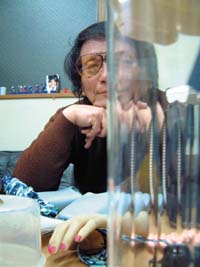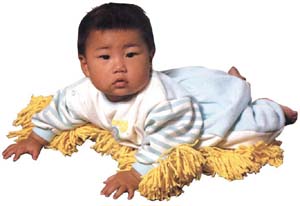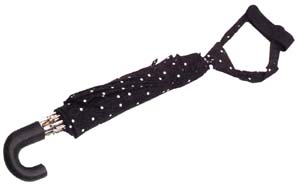The Chindogu Champion
Back to Contents of Issue: April 2002
|
|
|
|
by Tim Hornyak |
|
 YOU'RE ON A PACKED Tokyo commuter train, squeezed by a mass of bodies into a space where there's nothing to hold onto and the carriage is pitching violently. What do you do? YOU'RE ON A PACKED Tokyo commuter train, squeezed by a mass of bodies into a space where there's nothing to hold onto and the carriage is pitching violently. What do you do?
Why, take out your Portable Subway Strap, of course, and stand firm. You know, the handy-dandy toilet plunger with a ring at one end. Don't have one of those? Well, you do if your name is Kenji Kawakami, Japanese gadget guru extraordinaire and anarchic progenitor of chindogu, inventions that are almost completely useless, or to borrow Kawakami's word, "unuseless." Consider his Hay Fever Hat, a strap-on roll of toilet paper that provides allergy sufferers with a continuous supply of tissue that's always close at hand. Or the Portable Zebra Crossing, a roll-up crosswalk that gives you the right of way wherever you want it. And for the busy salaryman, there's the Anywhere Office, a wooden desktop that hangs from the neck, redefining business mobility. Such is the gentle art of unuseless inventing, something Kawakami, 55, has been practicing for the past 17 years. He has created more than 600 examples of chindogu -- a made-up word literally meaning Ôstrange tools' in Japanese -- and has built an international cult following of thousands through his books about them and their appearances on TV, the Internet, in magazine columns and museum exhibits. But the native of western Japan's Nara Prefecture may soon be headed for the big time in the US if a Hollywood producer has his way. J. Max Kirishima, who claims to be the only Japanese big cheese in Tinseltown, wants to create a chindogu TV series that would be the ÔAmerica's Funniest Home Videos' of kooky thingamabobs. But what exactly is a chindogu? They're more easily defined by what they're not: neither useful, political, patented, or for sale. But they are seemingly serviceable, certainly silly and always analog. Like Zen koans of invention, chindogu are designed to be both profound contradictions and simple tools to awaken the heart and mind. Take a recent brainchild that Kawakami plans to include in his fifth Japanese chindogu book: a golden, cylindrical combination lock he touts as the zenith of workaday mechanical security. That's because keeping the shackle in place are no less than 20 numbered dials, forming a combination that would challenge even an elephantine memory. In fact, trying all its possible combinations manually would take 3.2 trillion years; about 160 times the age of the universe. "The thief, his children, grandchildren and great-grandchildren would all be dead by then," laughs Kawakami. Instead of simplifying the safekeeping of valuables, the lock and its 20-digit combination make life exponentially more difficult for both owner and thief. Baby cloyhes combined with duster 
"Basically, chindogu is the same as the Industrial Revolution in Britain," he says. "The one big difference is that while most inventions are aimed at making life more convenient, chindogu have greater disadvantages than precursor products, so people can't sell them. They're invention dropouts." Kawakami began dreaming up doodads in the 1980s while editing popular home shopping magazine Tsuhan Seikatsu and has since produced such unuseless wonders as the Solar-Powered Flashlight, the Rotating Spaghetti Fork and the Velcro Jogger. Yet he doesn't own any patents and has never made a single yen by selling his creations. But that's not the point. Kawakami, who studied aeronautical engineering at Tokai University before he took to lobbing Molotov cocktails at police in the early 1970s as a leftist radical, says the art of chindogu is a rejection of the strait jacket of capitalistic utility, an anarchic antithesis to 21st-century consumer culture that can enrich people's lives and bring them closer together. "In the modern, digital world, everything is so quick," he says, picking up paper and electronic dictionaries to illustrate. "With the electronic one, it only takes two seconds to find a word, but it gives us no mental or spiritual satisfaction. Yet if you use your own hands to find it, you can enjoy the process. It's a spiritual act." That thinking has struck a chord. His chindogu books have sold nearly 200,000 copies in Japan since they were first published in 1990 and have been translated into English, Chinese, German, French and Spanish. There are roughly 8,000 chindogu practitioners in Japan and 1,000 overseas, their ages ranging from 10 to 70, according to Kawakami. One elderly Kobe resident who lost his house to the 1995 Great Hanshin Earthquake devises chindogu as a form of post-quake therapy. Despite owning several patents, an Osaka man in his 60s was a failure as an inventor, but his life was changed after discovering chindogu because it allows him to simply enjoy creating without having to worry about making money. The solar-powered torch  Enjoyment is what producer Kirishima sees in chindogu and his plans to bring them to the masses in the U.S. and elsewhere. With 11 low-budget feature film productions under his belt, the president of Den Pictures and author of How to Succeed in Hollywood is in talks with U.S. TV networks on producing a chindogu series that would feature Kawakami's novelties as well as gadget submissions from around the world.
Enjoyment is what producer Kirishima sees in chindogu and his plans to bring them to the masses in the U.S. and elsewhere. With 11 low-budget feature film productions under his belt, the president of Den Pictures and author of How to Succeed in Hollywood is in talks with U.S. TV networks on producing a chindogu series that would feature Kawakami's novelties as well as gadget submissions from around the world.
"People need to laugh for no reason," says 45-year-old Kirishima, who grew up in Shibuya and California. "I really believe in that. The concept is: You have it, I have it, everybody has this wackiness," he adds. "This is something that we left behind in our past somehow because of our adulthood, or you're busy doing this or that. But when you get in touch with it, it just pushes a button and brings it back. That's what brings a smile to your face. "You don't need to have it explained to you. It's just in you. It shakes you in a funny way that you can't help but get in touch with the basic human quality of being alive. "Cause when you're laughing and smiling, you're alive," he says. Although it may violate one of the Ten Tenets of Chindogu (see box above), Kawakami is willing to allow the show, if successful, to commercialize chindogu contraptions because some of the proceeds will go toward the removal of the estimated 4 to 7 million land mines in Cambodia. "It's our duty as rich industrialized nations to help poor ones," says Kawakami, who conceives new chindogu while eating yakitori. "I'm very concerned about the gap between rich and poor countries. If you think about the magnitude of the problem, the political and economic mess in Japan becomes a minor issue." Chindogu isn't all Kawakami does. He also runs a small Tokyo publishing firm and writes on topical issues when he is not inventing. He recently agreed to help market a product that is definitely non-chindogu and not analog, but seems unique: a 3D DVD package launched last December called 'EYE-vit' that can allegedly improve myopia in 90 percent of users through what he calls "self-healing." "It's an audiovisual attempt to help the eyes recover their original abilities," says Takashi Nishihira, director of Ginza-based Eye-vit Co. "We call it vision stress. There's too much visual information nowadays." Nishihira says people take in about 90 percent of their information through the eyes, but that ratio is rising with the IT revolution. Because people spend more time looking at relatively close objects such as computer screens, the ciliary muscles, which control the eye's lens, lose their ability to relax, he adds. The 38,000 yen EYE-vit DVD set features computer animations of dolphins and rotating orbs that move toward and away from the viewer, who wears 3D goggles included in the package. Soothing background music aids relaxation, and the firm claims before-and-after vision tests conducted on users show a significant improvement with only one try. The company says EYE-vit might relieve some people of the need to wear glasses. "It's like tai-chi for the eyes," says Kawakami, who sports oversized specs. "It's a way to exercise and stretch the eyes." The self-healing is another quality Kirishima sees in chindogu. He says the world needs it now, especially after the attacks of last September. "People might say that it's not the right time" for a chindogu show, he says. "But hey, we should do this kind of program because of (September 11), not in spite of it. Because of nine-eleven, because people hate each other, because people are afraid. They should just relax and get back to where we all came from. "I don't care where you're from -- Pakistan, Afghanistan, North America, Japan, anywhere -- people would laugh about this, and they need it." People outside Japan have had mixed reactions to chindogu. In North America, they're viewed as amusing Japanese party gags, in Europe as a new art form, and in Hong Kong and Taiwan as potential moneymakers. But because of their universal appeal, Kawakami doesn't see chindogu as 'Japanese' at all. "Japanese are good at copying, but not creating," he remarks, adding that his compatriots' tendency to behave according to group patterns often leads to a lack of fresh perspective. "Being free is the most important thing in life. Chindogu is the symbol of freedom, a free soul is needed to think of chindogu, to think of stupid, crazy things. You can never do it with common sense alone." Kawakami says that as mechanical anachronisms in the information technology age, chindogu can bring a sense of wonder and spiritual revitalization. "Chindogu is analog. There's always some process in analog products, and these processes themselves can be their purpose," he says. "We think analog," he notes, igniting another cigarette with his Che Guevara-emblazoned lighter. "Humans are originally analog beings. Digital is a way to get human ideas, but your fingers, your food are analog. The entrances and exits (to the human body) are always analog. "If you look at digital products, they all isolate people and leave them in their own small world, depriving them of the joy of communicating with others," he says. "I can't deny that they make life more exciting and convenient, but they also make human relationships more shallow and superficial." @ The umbrella 

Double-headed toothbrush for top and bottom teeth |
|
Note: The function "email this page" is currently not supported for this page.





